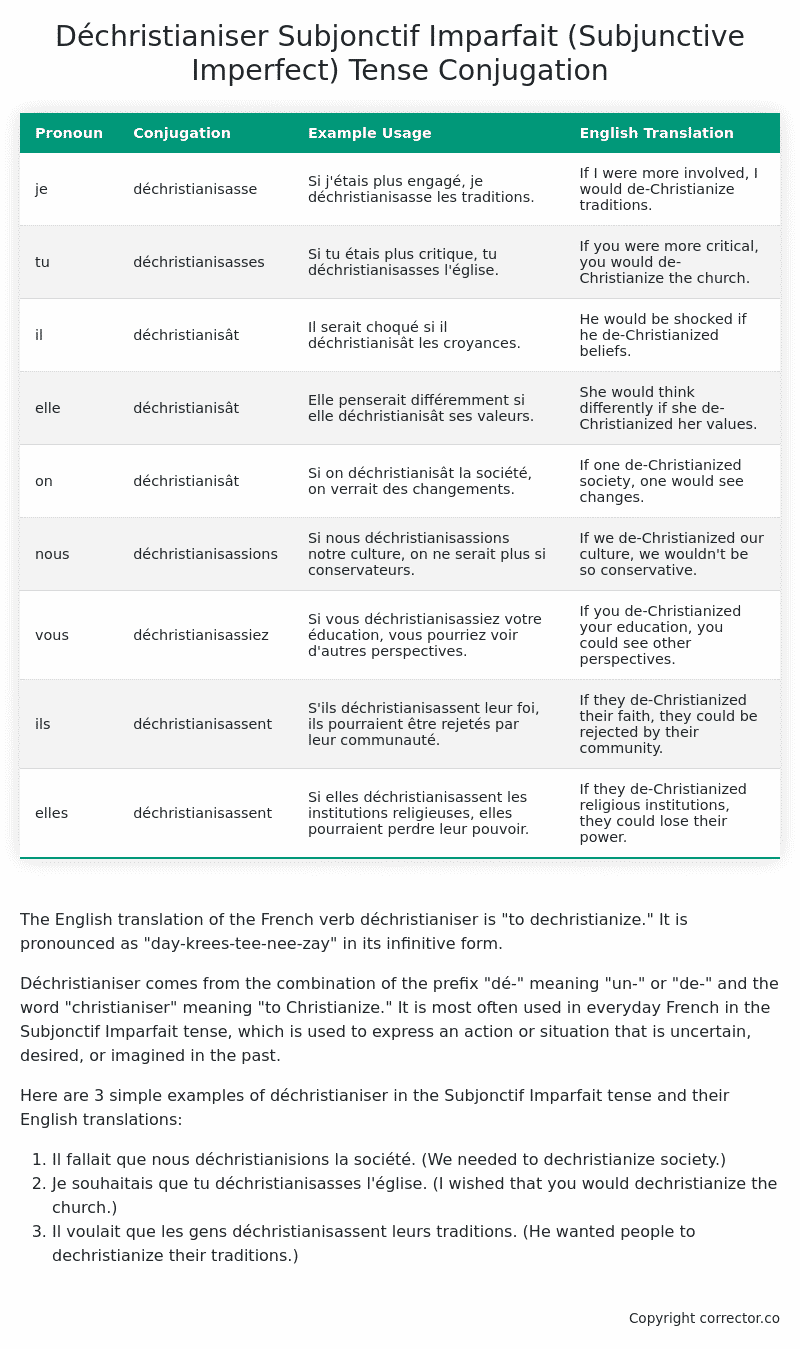Subjonctif Imparfait (Subjunctive Imperfect) Tense Conjugation of the French Verb déchristianiser
Introduction to the verb déchristianiser
The English translation of the French verb déchristianiser is “to dechristianize.” It is pronounced as “day-krees-tee-nee-zay” in its infinitive form.
Déchristianiser comes from the combination of the prefix “dé-” meaning “un-” or “de-” and the word “christianiser” meaning “to Christianize.” It is most often used in everyday French in the Subjonctif Imparfait tense, which is used to express an action or situation that is uncertain, desired, or imagined in the past.
Here are 3 simple examples of déchristianiser in the Subjonctif Imparfait tense and their English translations:
- Il fallait que nous déchristianisions la société. (We needed to dechristianize society.)
- Je souhaitais que tu déchristianisasses l’église. (I wished that you would dechristianize the church.)
- Il voulait que les gens déchristianisassent leurs traditions. (He wanted people to dechristianize their traditions.)
Table of the Subjonctif Imparfait (Subjunctive Imperfect) Tense Conjugation of déchristianiser
| Pronoun | Conjugation | Example Usage | English Translation |
|---|---|---|---|
| je | déchristianisasse | Si j’étais plus engagé, je déchristianisasse les traditions. | If I were more involved, I would de-Christianize traditions. |
| tu | déchristianisasses | Si tu étais plus critique, tu déchristianisasses l’église. | If you were more critical, you would de-Christianize the church. |
| il | déchristianisât | Il serait choqué si il déchristianisât les croyances. | He would be shocked if he de-Christianized beliefs. |
| elle | déchristianisât | Elle penserait différemment si elle déchristianisât ses valeurs. | She would think differently if she de-Christianized her values. |
| on | déchristianisât | Si on déchristianisât la société, on verrait des changements. | If one de-Christianized society, one would see changes. |
| nous | déchristianisassions | Si nous déchristianisassions notre culture, on ne serait plus si conservateurs. | If we de-Christianized our culture, we wouldn’t be so conservative. |
| vous | déchristianisassiez | Si vous déchristianisassiez votre éducation, vous pourriez voir d’autres perspectives. | If you de-Christianized your education, you could see other perspectives. |
| ils | déchristianisassent | S’ils déchristianisassent leur foi, ils pourraient être rejetés par leur communauté. | If they de-Christianized their faith, they could be rejected by their community. |
| elles | déchristianisassent | Si elles déchristianisassent les institutions religieuses, elles pourraient perdre leur pouvoir. | If they de-Christianized religious institutions, they could lose their power. |
Other Conjugations for Déchristianiser.
Le Present (Present Tense) Conjugation of the French Verb déchristianiser
Imparfait (Imperfect) Tense Conjugation of the French Verb déchristianiser
Passé Simple (Simple Past) Tense Conjugation of the French Verb déchristianiser
Passé Composé (Present Perfect) Tense Conjugation of the French Verb déchristianiser
Futur Simple (Simple Future) Tense Conjugation of the French Verb déchristianiser
Futur Proche (Near Future) Tense Conjugation of the French Verb déchristianiser
Plus-que-parfait (Pluperfect) Tense Conjugation of the French Verb déchristianiser
Passé Antérieur (Past Anterior) Tense Conjugation of the French Verb déchristianiser
Futur Antérieur (Future Anterior) Tense Conjugation of the French Verb déchristianiser
Subjonctif Présent (Subjunctive Present) Tense Conjugation of the French Verb déchristianiser
Subjonctif Passé (Subjunctive Past) Tense Conjugation of the French Verb déchristianiser
Subjonctif Imparfait (Subjunctive Imperfect) Tense Conjugation of the French Verb déchristianiser (this article)
Conditionnel Présent (Conditional Present) Tense Conjugation of the French Verb déchristianiser
Conditionnel Passé (Conditional Past) Tense Conjugation of the French Verb déchristianiser
L’impératif Présent (Imperative Present) Tense Conjugation of the French Verb déchristianiser
L’infinitif Présent (Infinitive Present) Tense Conjugation of the French Verb déchristianiser
Struggling with French verbs or the language in general? Why not use our free French Grammar Checker – no registration required!
Get a FREE Download Study Sheet of this Conjugation 🔥
Simply right click the image below, click “save image” and get your free reference for the déchristianiser Subjonctif Imparfait tense conjugation!

Déchristianiser – About the French Subjonctif Imparfait (Subjunctive Imperfect) Tense
Formation
Common Everyday Usage Patterns
Interactions with Other Tenses
Subjonctif Présent
Indicatif Passé Composé
Conditional
Conditional Perfect
Summary
I hope you enjoyed this article on the verb déchristianiser. Still in a learning mood? Check out another TOTALLY random French verb conjugation!


